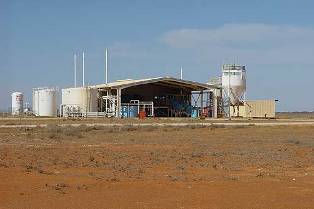Mitsui buys into Australian uranium
16 October 2008
Japan's Mitsui & Co has agreed to buy a 49% interest in six Australian uranium deposits held by Uranium One, including the Honeymoon project which is already under development.
 |
| The demonstration plant at Honeymoon (Image: Uranium One) |
The portfolio also includes the Goulds Dam and Billeroo projects and other prospective tenements on the Stuart Shelf and Eyre Peninsula, all as yet undeveloped.
In contrast, construction work is already under way at Honeymoon, although Uranium One announced in May that it was suspending development activities at Honeymoon "to allow for evaluation of corporate development opportunities". The development costs of the project will now be borne in proportion to the two companies' respective shares in the joint venture, and according to Uranium One, most of the A$104 million ($70.2 million) Mitsui will be paying for its share of the projects will be used to advance the development of Honeymoon through to commercial operation. The mine, which will use the in-situ recovery method, is expected to have an annual output of 400 tU
3O
8 over a period of 6 years and according to Mitsui is now expected to start commercial operation "sometime from the end of 2009 to 2010".
The two companies have signed a sale and purchase agreement and a joint venture agreement for the development of the projects. The agreements are conditional upon statutory approvals from the Australian government, but the companies aim to complete the deal by the end of 2008.
The investment is Mitsui's first in a uranium project, although earlier this year the company entered into negotiations with Uzbekistan to set up a uranium exploration joint venture. In 2006, it agreed to carry out a joint feasibility study with Russia on the undeveloped Yuzhnaya uranium deposit.
Japan relies on its 55 nuclear reactors for 27.5% of its total electricity production but has no uranium resources of its own, currently obtaining about one-third of its annual requirements from Australia, followed by Canada, Kazakhstan and other countries. Japanese companies are active in working to secure their uranium supplies through joint ventures with mining companies and others, and helping to develop uranium projects. Japanese companies have interests in uranium projects in Canada and Kazakhstan, and earlier this year Mitsubishi, through a joint venture with Canadian company Cameco, purchased 30% of the Kintyre uranium deposit in Western Australia.